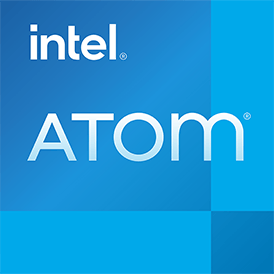
Intel Atom x7-Z8700 Benchmark, Test and specs
Last updated:
The Intel Atom x7-Z8700 was released in Q1/2015 and has 4 cores. The processor can process 4 threads simultaneously and uses a mainboard with the socket BGA 138. In the Geekbench 5 benchmark, the Intel Atom x7-Z8700 achieved a result of 239 points (single-core) or 838 points (multi-core).

| Name: | Intel Atom x7-Z8700 |
|---|---|
| Family: | Intel Atom (108) |
| CPU group: | Intel Atom x3/x5/x7 (9) |
| Architecture: | Cherry Trail |
| Segment: | Mobile |
| Generation: | 5 |
| Predecessor: | -- |
| Successor: | -- |
CPU Cores and Base Frequency
The Intel Atom x7-Z8700 has 4 cores. The clock frequency of the Intel Atom x7-Z8700 is 1.60 GHz (2.40 GHz). An initial performance assessment can be made using the number of CPU cores.
| CPU Cores / Threads: | 4 / 4 |
|---|---|
| Core architecture: | normal |
| Cores: | 4x |
| Hyperthreading / SMT: | No |
|---|---|
| Overclocking: | No |
| Frequency: | 1.60 GHz |
| Turbo Frequency (1 Core): | 2.40 GHz |
| Turbo Frequency (4 Cores): | 2.40 GHz |
Internal Graphics
The Intel Atom x7-Z8700 has an integrated graphics that the system can use to efficiently play back videos. The Intel Atom x7-Z8700 has the Intel HD Graphics 405 (16EU) installed, which has 16 streaming multiprocessors (128 shaders).
| GPU name: | Intel HD Graphics 405 (16EU) |
|---|---|
| GPU frequency: | 0.20 GHz |
| GPU (Turbo): | 0.60 GHz |
| Compute units: | 16 |
| Shader: | 128 |
| Hardware Raytracing: | No |
| Release date: | Q2/2015 |
| Max. displays: | 3 |
|---|---|
| Generation: | 8 |
| Direct X: | 12 |
| Technology: | 14 nm |
| Max. GPU Memory: | 8 GB |
| Frame Generation: | No |
Hardware codec support
Processors with integrated graphics can process video codecs faster. Support for modern codecs can significantly increase system efficiency during video playback.
| h265 / HEVC (8 bit): | No |
|---|---|
| h265 / HEVC (10 bit): | No |
| h264: | Decode / Encode |
| VP8: | Decode |
| VP9: | No |
| AV1: | No |
|---|---|
| AVC: | Decode / Encode |
| VC-1: | Decode |
| JPEG: | Decode |
Memory & PCIeThe Intel Atom x7-Z8700 supports a maximum of 8 GB memory. Depending on the mainboard, the processor can use a maximum of 2 (Dual Channel) memory channels. This results in a maximum bandwidth of the main memory of 25.6 GB/s. |
|
| Memory type: | Memory bandwidth: |
|---|---|
| LPDDR3-1600 | 25.6 GB/s |
| Max. Memory: | 8 GB |
| Memory channels: | 2 (Dual Channel) |
| ECC: | No |
| PCIe: | 2.0 x 2 |
| PCIe Bandwidth: | 1.0 GB/s |
Thermal ManagementThe Intel Atom x7-Z8700 has a TDP of 2 W. Based on the TDP, the system manufacturer can and must adapt the cooling solution to the processor. |
|
|---|---|
| TDP (PL1 / PBP): | 2 W |
| TDP (PL2): | -- |
| TDP up: | -- |
| TDP down: | -- |
| Tjunction max.: | -- |
Technical details
Modern production reduces the waste heat of a processor and increases its efficiency. The Intel Atom x7-Z8700 is made in 14 nm and has 2.00 MB cache.
| Technology: | 14 nm |
|---|---|
| Chip design: | Monolithic |
| Socket: | BGA 138 |
| L2-Cache: | -- |
| L3-Cache: | 2.00 MB |
| AES-NI: | Yes |
| Operating systems: |
| Virtualization: | VT-x, VT-x EPT |
|---|---|
| Instruction set (ISA): | x86-64 (64 bit) |
| ISA extensions: | SSE4.1, SSE4.2 |
| Release date: | Q1/2015 |
| Release price: | 30 $ |
| Part Number: | -- |
| Documents: | Technical data sheet |
Rate this processor
Benchmark results

The benchmark results for the Intel Atom x7-Z8700 have been carefully checked by us. We only publish benchmark results that have been created by us or that have been submitted by a visitor and then checked by a team member. All results are based on and fullfill our benchmark guidelines.
Geekbench 5, 64bit (Single-Core)
Geekbench 5 is a cross plattform benchmark that heavily uses the systems memory. A fast memory will push the result a lot. The single-core test only uses one CPU core, the amount of cores or hyperthreading ability doesn't count.

|
AMD A8-3500M
4C 4T @ 2.40 GHz |
||

|
AMD A6-6310
4C 4T @ 2.40 GHz |
||

|
Intel Pentium J2900
4C 4T @ 2.67 GHz |
||
|
|
Intel Atom x7-Z8700
4C 4T @ 2.40 GHz |
||

|
Intel Atom x7-Z8750
4C 4T @ 2.56 GHz |
||

|
Intel Celeron J1750
2C 2T @ 2.41 GHz |
||

|
Intel Celeron J1800
2C 2T @ 2.58 GHz |
||
Geekbench 5, 64bit (Multi-Core)
Geekbench 5 is a cross plattform benchmark that heavily uses the systems memory. A fast memory will push the result a lot. The multi-core test involves all CPU cores and taks a big advantage of hyperthreading.

|
AMD A8-3510MX
4C 4T @ 2.50 GHz |
||

|
Intel Celeron 4205U
2C 2T @ 1.80 GHz |
||

|
Intel Celeron 5205U
2C 2T @ 1.90 GHz |
||
|
|
Intel Atom x7-Z8700
4C 4T @ 2.40 GHz |
||

|
Intel Pentium 4405Y
2C 4T @ 1.50 GHz |
||

|
Intel Pentium N3710
4C 4T @ 2.56 GHz |
||

|
AMD GX-424CC
4C 4T @ 2.40 GHz |
||
Geekbench 6 (Single-Core)
Geekbench 6 is a benchmark for modern computers, notebooks and smartphones. What is new is an optimized utilization of newer CPU architectures, e.g. based on the big.LITTLE concept and combining CPU cores of different sizes. The single-core benchmark only evaluates the performance of the fastest CPU core, the number of CPU cores in a processor is irrelevant here.

|
AMD Athlon 5150
4C 4T @ 1.60 GHz |
||

|
Intel Celeron N2830
2C 2T @ 2.41 GHz |
||

|
MediaTek MT8168
4C 4T @ 2.00 GHz |
||
|
|
Intel Atom x7-Z8700
4C 4T @ 2.40 GHz |
||

|
Intel Pentium N3700
4C 4T @ 2.40 GHz |
||

|
Intel Celeron J1900
4C 4T @ 2.42 GHz |
||

|
Intel Celeron N2820
2C 2T @ 2.39 GHz |
||
Geekbench 6 (Multi-Core)
Geekbench 6 is a benchmark for modern computers, notebooks and smartphones. What is new is an optimized utilization of newer CPU architectures, e.g. based on the big.LITTLE concept and combining CPU cores of different sizes. The multi-core benchmark evaluates the performance of all of the processor's CPU cores. Virtual thread improvements such as AMD SMT or Intel's Hyper-Threading have a positive impact on the benchmark result.

|
Intel Core i3-3217UE
2C 4T @ 1.60 GHz |
||

|
Intel Celeron 3215U
2C 2T @ 1.70 GHz |
||

|
Apple A8
2C 2T @ 1.50 GHz |
||
|
|
Intel Atom x7-Z8700
4C 4T @ 2.40 GHz |
||

|
AMD Athlon 5150
4C 4T @ 1.60 GHz |
||

|
Intel Pentium J2900
4C 4T @ 2.67 GHz |
||

|
Intel Atom x5-Z8550
4C 4T @ 2.40 GHz |
||
iGPU - FP32 Performance (Single-precision GFLOPS)
The theoretical computing performance of the internal graphics unit of the processor with simple accuracy (32 bit) in GFLOPS. GFLOPS indicates how many billion floating point operations the iGPU can perform per second.

|
Intel Celeron 3205U
Intel HD Graphics (Broadwell GT1) @ 0.80 GHz |
||

|
Intel Celeron 3755U
Intel HD Graphics (Broadwell GT1) @ 0.80 GHz |
||

|
Intel Pentium 3805U
Intel HD Graphics (Broadwell GT1) @ 0.80 GHz |
||
|
|
Intel Atom x7-Z8700
Intel HD Graphics 405 (16EU) @ 0.60 GHz |
||

|
Intel Celeron J3060
Intel HD Graphics 400 @ 0.70 GHz |
||

|
Intel Celeron J3160
Intel HD Graphics 400 @ 0.70 GHz |
||

|
Intel Celeron J4125
Intel UHD Graphics 600 @ 0.75 GHz |
||
Estimated results for PassMark CPU Mark
Some of the CPUs listed below have been benchmarked by CPU-monkey. However the majority of CPUs have not been tested and the results have been estimated by a CPU-monkey’s secret proprietary formula. As such they do not accurately reflect the actual Passmark CPU mark values and are not endorsed by PassMark Software Pty Ltd.

|
AMD Athlon II X2 280
2C 2T @ 3.60 GHz |
||

|
AMD A4-5300
2C 2T @ 3.60 GHz |
||

|
AMD A4-3330MX
2C 2T @ 2.60 GHz |
||
|
|
Intel Atom x7-Z8700
4C 4T @ 2.40 GHz |
||

|
Intel Pentium 3825U
2C 4T @ 1.90 GHz |
||

|
Intel Celeron 4205U
2C 2T @ 1.80 GHz |
||

|
Intel Atom x7-Z8750
4C 4T @ 2.56 GHz |
||
Cinebench R15 (Single-Core)
Cinebench R15 is the successor of Cinebench 11.5 and is also based on the Cinema 4 Suite. Cinema 4 is a worldwide used software to create 3D forms. The single-core test only uses one CPU core, the amount of cores or hyperthreading ability doesn't count.

|
Intel Celeron J1800
2C 2T @ 2.58 GHz |
||

|
Intel Celeron N2840
2C 2T @ 2.58 GHz |
||

|
Intel Pentium N3540
4C 4T @ 2.66 GHz |
||
|
|
Intel Atom x7-Z8700
4C 4T @ 2.40 GHz |
||

|
Intel Atom x7-E3950
4C 4T @ 2.00 GHz |
||

|
Intel Atom x5-Z8550
4C 4T @ 2.40 GHz |
||

|
Intel Pentium N3530
4C 4T @ 2.58 GHz |
||
Cinebench R15 (Multi-Core)
Cinebench R15 is the successor of Cinebench 11.5 and is also based on the Cinema 4 Suite. Cinema 4 is a worldwide used software to create 3D forms. The multi-core test involves all CPU cores and taks a big advantage of hyperthreading.

|
AMD Athlon II X2 370K
2C 2T @ 4.20 GHz |
||

|
Intel Celeron J1900
4C 4T @ 2.42 GHz |
||

|
AMD A8-7100
4C 4T @ 2.40 GHz |
||
|
|
Intel Atom x7-Z8700
4C 4T @ 2.40 GHz |
||

|
Intel Atom x5-Z8550
4C 4T @ 2.40 GHz |
||

|
Intel Pentium N3700
4C 4T @ 2.40 GHz |
||

|
Intel Pentium N3510
4C 4T @ 2.40 GHz |
||
Benchmarks

Geekbench 5 (SC)
2,488 entries
2,488 entries

Geekbench 5 (MC)
2,461 entries
2,461 entries

Geekbench 6 (SC)
1,755 entries
1,755 entries

Geekbench 6 (MC)
1,703 entries
1,703 entries

FP32 SP (iGPU)
2,042 entries
2,042 entries

PassMark CPU-Mark
2,392 entries
2,392 entries

Cinebench R15 (SC)
1,106 entries
1,106 entries

Cinebench R15 (MC)
1,101 entries
1,101 entries

Cinebench R11.5 (SC)
825 entries
825 entries

Cinebench R11.5 (MC)
836 entries
836 entries

Cinebench R11.5 iGPU
383 entries
383 entries
Popular comparisons
back to index






